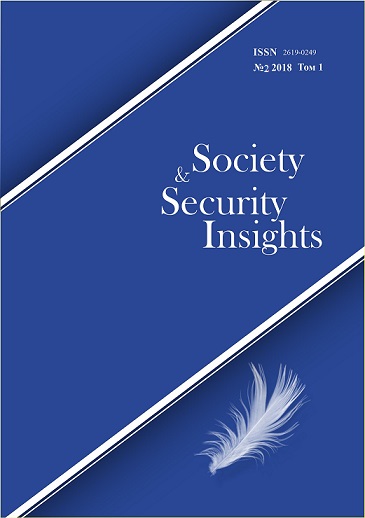GENERALIZED TRUST IN RUSSIAN BORDER REGIONS AS INDICATOR OFSOCIAL SAFETY
Main Article Content
Abstract
The article focuses on generalized trust, defining positive attitude towards others and the potential to cooperate even with unknown people, its use as a possible indicator of social safety and openness, the state of interpersonal and inter-group relations in Russian society. Drawing on the results of sociological surveys in six border regions (n = 2400), the authors fulfill a detailed comparative analysis of the three various indicators of trust (trust towards people as a whole, trust towards social environment, readiness to help others), reveal factors, explaining differences in levels of trust tailored to regional specific, attempt to build an integral index and describe general models of trust. Significant associations between separate indicators of trust were found in the analysis, they concern level of education, type of settlement, social and material position, in some regions the level of trust was related to nationality and religiousness. The results witness about heterogenous distribution of trust in different social groups and strata in border territories.
Downloads
Metrics
Article Details
Authors retain the copyright of their manuscripts, and all Open Access articles are distributed under the terms of the Creative Commons Attribution License, which permits unrestricted use, distribution, and reproduction in any medium, provided that the original work is properly cited.
References
Иванов А.В. Теория социального доверия: методологические проблемы социально-философской концептуализации. Современные проблемы науки и образования, 2015, (1-1), 17–34.
Лига М. Б. Социальная безопасность и качество жизни: концептуальный анализ. Ученые записки Забайкальского государственного университета. Серия: Социологические науки, 2013, 4(51), 170–177.
Фукуяма Ф. Доверие: социальные добродетели и путь к процветанию. М.: ACT; НПП «Ермак», 2004.
Штомпка П. Доверие–основа общества. М, 2012.
Braithwaite V., Levi M. (Eds.). (2003). Trust and governance. Russell Sage Foundation.
Colquitt J. A., Scott B. A., LePine J. A. Trust, trustworthiness, and trust propensity: a metanalytic test of their unique relationships with risk taking and job performance. Journal of applied psychology, 2007, 92(4), 909–927. doi:10.1037/0021-9010.92.4.909
Delhey J., Newton K. Who trusts?: The origins of social trust in seven societies. European Societies, 2003, 5(2), 93–137. doi:10.1080/1461669032000072256
Glaeser, E., Laibson D., Scheinkman J., Soutter C. Measuring trust. Quarterly Journal of Economics, 2000, 115(3), 811–846. doi:10.1162/003355300554926
Luhmann N. Familiarity, confidence, trust: Problems and alternatives. Trust: Making and breaking cooperative relations, 2000, (6), 94–107.
Nannestad P. (2008). What have we learned about generalized trust, if anything?. Annu.Rev. Polit. Sci., 11, 413-436. doi:10.1146/annurev.polisci.11.060606.135412
Newton K. Trust, social capital, civil society, and democracy. International Political Science Review, 2001, 22(2), 201–214. doi:10.1177/0192512101222004
Rizopoulos D. ltm: An R package for latent variable modeling and item response theory analyses. Journal of statistical software, 2006, 17(5), 1–25. doi:10.18637/jss.v017.i05
Samejima F. Graded response model. In: Handbook of modern item response theory. Springer New York, 1997. Pp.85–100. doi:10.1007/978-1-4757-2691-6_5
Simmel, G. The Sociology of Georg Simmel, translated and edited by Kurt Wolff, Glencoe, Ill.: Free Press, 1950.
Stolle D. Trusting strangers – the concept of generalized trust in perspective. Austrian Journal of Political Science, 2002, 31(4), 397–412.
Uslaner E. M. The moral foundations of trust. Cambridge University Press, 2002.
Uslaner, E. M. Trust, democracy and governance: Can government policies influence generalized trust? In: Generating social capital. Palgrave Macmillan, New York, 2003. pp.171-190. doi:10.1057/9781403979544_9
Van Lange, P. A. M. Generalized Trust. Current Directions in Psychological Science, 2015, 24(1), 71–76. doi:10.1177/0963721414552473

